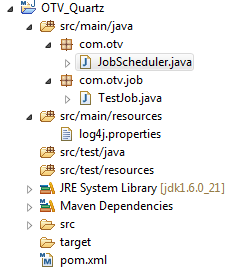Quartz 2 Scheduler example
Quartz is an open source job scheduling framework. It can be used to manage and schedule jobs in the application.
STEP 1 : CREATE MAVEN PROJECT
A maven project is created as below. (It can be created by using Maven or IDE Plug-in).

STEP 2 : LIBRARIES
Quartz dependencies are added to Maven’ s pom.xml. These dependency libraries will be downloaded by Maven Central Repository.
<project xmlns="http://maven.apache.org/POM/4.0.0" xmlns:xsi="http://www.w3.org/2001/XMLSchema-instance"
xsi:schemaLocation="http://maven.apache.org/POM/4.0.0 http://maven.apache.org/xsd/maven-4.0.0.xsd">
<modelVersion>4.0.0</modelVersion>
<groupId>OTV_Quartz</groupId>
<artifactId>OTV_Quartz</artifactId>
<version>0.0.1-SNAPSHOT</version>
<dependencies>
<!-- Quartz library -->
<dependency>
<groupId>org.quartz-scheduler</groupId>
<artifactId>quartz</artifactId>
<version>2.0.2</version>
</dependency>
<!-- Log4j library -->
<dependency>
<groupId>log4j</groupId>
<artifactId>log4j</artifactId>
<version>1.2.16</version>
</dependency>
</dependencies>
</project>
STEP 3 : CREATE NEW JOB
A new Job is created by implementing the Quartz Job interface as below. TestJob Class specifies business logic which will be scheduled.
package com.otv.job;
import org.apache.log4j.Logger;
import org.quartz.Job;
import org.quartz.JobExecutionContext;
import org.quartz.JobExecutionException;
public class TestJob implements Job {
private Logger log = Logger.getLogger(TestJob.class);
public void execute(JobExecutionContext jExeCtx) throws JobExecutionException {
log.debug("TestJob run successfully...");
}
}
STEP 4 : LINK JOB WITH JOBDETAIL OBJECT
Created TestJob class is linked with a JobDetail object.
JobDetail job = JobBuilder.newJob(TestJob.class)
.withIdentity("testJob")
.build();
STEP 5 : CREATE NEW TRIGGER
A new trigger is created as below. Trigger Class specifies running period of the job which will be scheduled. There are two kind of Quartz Triggers as:
Trigger : specifies start time, end time, running period of the job.
CronTrigger : specifies start time, end time, running period of the job according to Unix cron expression.
//Trigger the job to run on the next round minute
Trigger trigger = TriggerBuilder.newTrigger()
.withSchedule(
SimpleScheduleBuilder.simpleSchedule()
.withIntervalInSeconds(30)
.repeatForever())
.build();
// CronTrigger the job to run on the every 20 seconds
CronTrigger cronTrigger = TriggerBuilder.newTrigger()
.withIdentity("crontrigger","crontriggergroup1")
.withSchedule(CronScheduleBuilder.cronSchedule("10 * * * * ?"))
.build();
STEP 6 : CREATE SchedulerFactory
A new SchedulerFactory is created and a Scheduler object is gotten from SchedulerFactory Class.
SchedulerFactory schFactory = new StdSchedulerFactory(); Scheduler sch = schFactory.getScheduler();
STEP 7 : START Scheduler
Scheduler Object is started.
// Start the schedule sch.start();
STEP 8 : SCHEDULE JOB
TestJob is scheduled:
// Tell quartz to schedule the job using the trigger sch.scheduleJob(job, trigger);
STEP 9 : FULL EXAMPLE
TestJob will run two times per minute.
package com.otv;
import org.quartz.JobBuilder;
import org.quartz.JobDetail;
import org.quartz.Scheduler;
import org.quartz.SchedulerException;
import org.quartz.SchedulerFactory;
import org.quartz.SimpleScheduleBuilder;
import org.quartz.Trigger;
import org.quartz.TriggerBuilder;
import org.quartz.impl.StdSchedulerFactory;
import com.otv.job.TestJob;
/**
* @author onlinetechvision.com
* @since 17 Sept 2011
* @version 1.0.0
*
*/
public class JobScheduler {
public static void main(String[] args) {
try {
// specify the job' s details..
JobDetail job = JobBuilder.newJob(TestJob.class)
.withIdentity("testJob")
.build();
// specify the running period of the job
Trigger trigger = TriggerBuilder.newTrigger()
.withSchedule(SimpleScheduleBuilder.simpleSchedule()
.withIntervalInSeconds(30)
.repeatForever())
.build();
//schedule the job
SchedulerFactory schFactory = new StdSchedulerFactory();
Scheduler sch = schFactory.getScheduler();
sch.start();
sch.scheduleJob(job, trigger);
} catch (SchedulerException e) {
e.printStackTrace();
}
}
}
STEP 10 : OUTPUT
When JobScheduler Class is run, the output will be seen as below:
17.09.2011 23:39:37 DEBUG (TestJob.java:13) - TestJob run successfully... 17.09.2011 23:40:07 DEBUG (TestJob.java:13) - TestJob run successfully... 17.09.2011 23:40:37 DEBUG (TestJob.java:13) - TestJob run successfully... 17.09.2011 23:41:07 DEBUG (TestJob.java:13) - TestJob run successfully...
STEP 11 : DOWNLOAD
Reference: Quartz 2 Scheduler from our JCG partner Eren Avsarogullari at the Online Technology Vision blog.






Thanks for posting it , very crisp and clear.
I found some more references on same.
http://techidiocy.com/quartz-scheduler-framework-in-java-and-integration-with-spring-example/
thx, it is clear and solve me a big problem!!!
Hi,
Just want to point readers to QuartzDesk (http://www.quartzdesk.com). QuartzDesk is a advanced graphical frontend for the management and monitoring of Quartz schedulers, jobs and triggers running in all sorts of Java applications. Lite (free) license available as well as 30-day trial licenses for all non-free editions. I sincerely hope you will find this new tool useful.
Best regards,
Jan Moravec
QuartzDesk Project Founder
This made my day. Thank you so much.
Thanks for sharing. Just in case anyone encounters ‘log4j:WARN No appenders could be found for logger (org.quartz.impl.StdSchedulerFactory)’ warning, creating a simple log4j.xml and adding this file in your classpath should resolve the warning and you should be able to view the degig message from TestJob class. Details on what needs to go into the log4j.xml file can be found here – http://wiki.apache.org/logging-log4j/Log4jXmlFormat
I am getting compilation error.
The method newJob(Class) in the type JobBuilder is not applicable for the arguments (Class).
Any thought?
Please download latest jar quartz 2.1.5 from maven repository. now remove all import statements and try ctrl + shift+ o once. it will automatically resolve it.
How to use autowired class methos as task